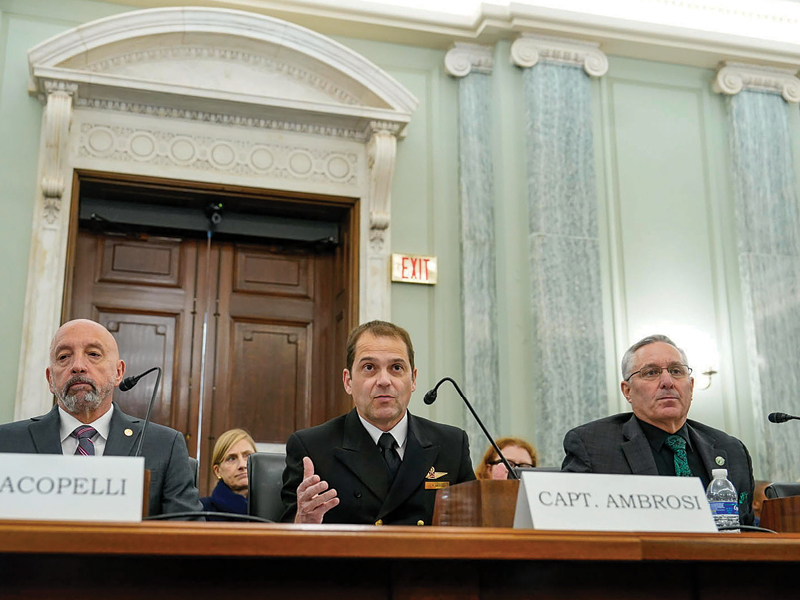ALPA Tells Congress: ATC Modernization Is Imperative to Meet Aviation Demands
By John Perkinson, Senior Staff Writer

Capt. Jason Ambrosi, ALPA’s president, center, testifies at the “U.S. Air Traffic Control Systems, Personnel, and Safety” congressional hearing.
Amid aging air traffic control infrastructure, controller understaffing, and a series of near misses at U.S. airports, Capt. Jason Ambrosi, ALPA’s president, testified on Dec. 12, 2024, at a congressional hearing titled “U.S. Air Traffic Control Systems, Personnel, and Safety.” Conducted by the Senate Subcommittee on Aviation Safety, Operations, and Innovation, the hearing examined the state of America’s ATC operations and welcomed recommendations to strengthen safety measures in light of the anticipated increases in air travel demand and airspace users.
“As operators in the system, pilots have a vested interest in the FAA sustaining legacy systems and advancing technological and infrastructure improvements to ensure the national airspace system remains safe and efficient,” Ambrosi remarked. However, he noted that some of the benefits of the Next Generation Air Transportation System (NextGen) aren’t being fully realized due to a lack of the necessary equipment on many airliners and at numerous airports.
“As a result, pilots and air traffic controllers are forced to use ‘work-arounds’ that allow us to operate aircraft with outdated equipment in today’s complex system, all of which runs counter to the anticipated benefits of NextGen,” Ambrosi stated.
Throughout the hearing, participating senators and witnesses cited near-miss events, including the incident at Austin-Bergstrom International Airport on Feb. 4, 2023, when a FedEx Express B-767, in dense fog, flew fewer than 200 feet from a Southwest Airlines B-737, after both were cleared to use the same runway. ALPA’s president once again stressed the importance of having at least two highly trained and well-rested pilots on an airline flight deck as a critical safety feature. “We’re able to see, hear, feel, and react to issues in real time, and, as the Austin incident showed, we save lives,” he said.
Amid these and other challenges, the FAA’s Air Traffic Organization continues to face scrutiny. In addition to a 114-page FAA evaluation titled “Assessing Fatigue Risk in FAA Air Traffic Operations” that examined controller workload and performance, the Government Accountability Office (GAO) recently conducted its own operational risk assessment. It found “that of FAA’s 138 systems, 51 (37 percent) were unsustainable and 54 (39 percent) were potentially unsustainable.”
The GAO analysis concluded, “Until the FAA takes urgent action to reduce the time frames to replace critical and at-risk ATC systems, it will continue to rely on a large percentage of unsustainable systems to perform critical functions for safe air travel.”
“While Congress has provided the funding each year by the FAA during the annual appropriations process, there remains a significant shortfall in numerous maintenance and modernization efforts,” Ambrosi observed. “Resources haven’t kept up with inflation and effectively require the agency to prioritize sustainment to the detriment of modernization and infrastructure needs.”
The Air Traffic Organization must also prepare for future demands. In his written statement to the subcommittee, Ambrosi stressed, “The future of air transportation will bring a combination of commercial air carriers, unmanned aerial vehicles, general aviation, urban air mobility devices, and commercial spaceflight. The airspace system of the future will involve a wider and more complex variety of operations that our air traffic control infrastructure must manage safely and efficiently.”
During the hearing, ALPA’s president answered questions from senators including a query from subcommittee chair Sen. Tammy Duckworth (D-IL) about the adequacy of current precautionary measures.
“You can never say we’re safe enough,” Ambrosi asserted. “There needs to be that next step forward in safety where we get the technology that supports the human element—the air traffic controllers, the pilots. We absolutely need that next investment and that push forward to the next level for all of us to continue the operation and make it safer.”
Held in the Russell Senate Office Building, the hearing marked the fifth occasion during the 118th United States Congress in which Ambrosi has testified before a congressional committee. Other witnesses included Kevin Walsh, director of Information Technology and Cybersecurity for the GAO; Dave Spero, president of the Professional Aviation Safety Specialists, AFL-CIO; Dean Iacopelli, chief of staff of the National Air Traffic Controllers Association; and Marc Scribner, senior transportation policy analyst for the Reason Foundation.

